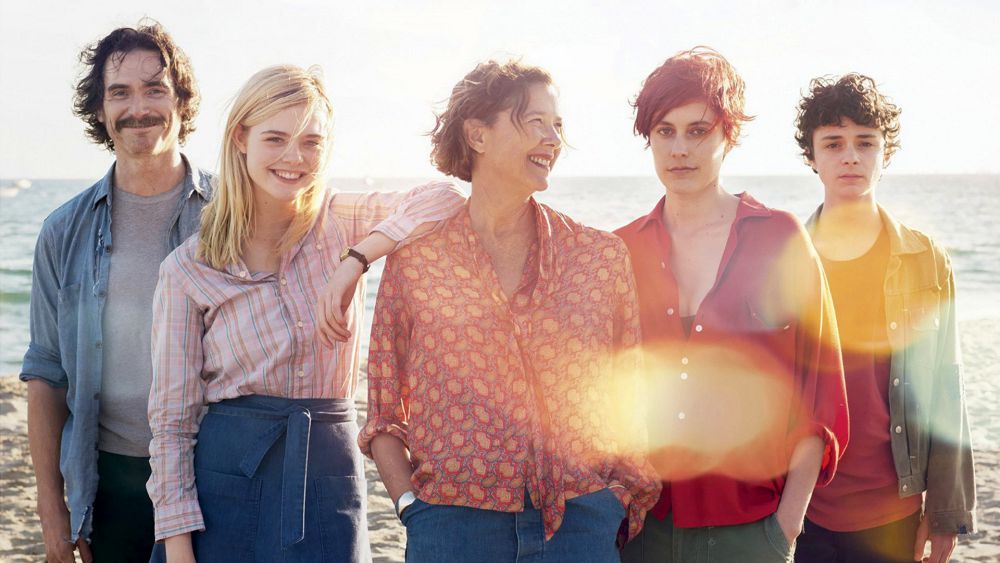 (4.5 / 5)
(4.5 / 5)
“Happy families are all alike; every unhappy family is unhappy in its own way.” The surrogate bunch in Mike Mills’ latest, 20th Century Women, is certainly unique; if not quite unhappy.
It’s tough being a kid: discovering your sense of self, your place in the world. It’s all the more complex, I’d imagine, when you’re a smart, conscientious kid at a time and place when the world’s going through something of a transitional phase itself.
Jamie Fields (Lucas Jade Zumann) is just such a kid; growing up in Santa Barbara, California circa 1979, surrounded by three generations of strong, opinionated women. Just as his last film film, 2010’s Beginners – for which Christopher Plummer won the Oscar for Best Supporting Actor – was based on his dad’s coming out at age 75, 20th Century Women takes its inspiration from Mills’ mother.
Like Mills’ mum, Dorothea (Annette Benning) was born during the Depression — a reason given to explain everything about her, from her empowered brittleness to her chain-smoking. A single mum living in a ramshackle fixer-upper, she enjoys big-band music and methodically checking her stocks. She delights in her son’s skateboarding and is bemused by his taste in music.
Even so, even when being candid, there’s a sense that Dorothea is holding back, and she admits that she feels like she knows Jamie less and less every day. As such, she turns, somewhat formally, to his two best friends, their punk-y lodger Abbie (Greta Gerwig) and his unrequited love Julie (Elle Fanning), to help with his upbringing.
Former art student Abbie takes experimental photos and reads second-wave feminism. Waves are a feature in California living. They break like thin translucent cellophane on sandy shallows, stirring up dust beneath the surface. Sean Porter’s cinematography is bright and airy – nostalgia in the form of light. Roger Neill’s ethereal, synth score, which reminded me at points of Highlander, carries us along.
The blonde, loose-limbed Julie, meanwhile, thinks of herself as a sophisticate: she smokes, she reads serious literature, and sleeps with boys – but not Jamie. Their physical intimacy does, however, extend to his bedroom; in which she is perennially sleeping over. Jamie is too decent a guy to make too big a deal of it.
Called upon to be both tough and sensitive, a shoulder to cry on and an insouciant sloucher, Jamie rises to the challenge; both amusingly – his theoretical knowledge of the female orgasm does not endear him to his bragging peers – and with pathos
20th Century Women is a lightly observed yet deeply humanist look at how Jamie’s character is shaped by these three woman; by how they’re there for him and he for them. Omniscient monologues occasionally peek ahead years, even decades down the line; just as montages of personal photos old movies (mostly Bogart), music (vitally Bowie), reveal the formative influences on the older generations.
Mills deconstructs these characters without ever itemizing them. The Fields’ other lodger, for instance – the long-haired, mustachioed William (Billy Crudup) – is a Gaia-loving ladies-man-cum-handyman. The other characters may giggle at his hippy ways, but the film never does; instead it shows us the how and why of them.
20th Century Women also provides a sociological slant to the era, from the divides within the punk scene, then on its way out, to Jimmy Carter’s “Crisis of Confidence” speech. We see the characters as products of their time and upbringing, the forces that shaped them – there are no fathers, for instance – but also as complex characters in their own right; distinct personalities suspended within the flow of history.
In this, the cast is sublime: Benning’s fierceness and delicacy as she opens up about life’s disappointments; Zumann’s remarkable subtlety in listening; Gerwig’s inner glow as she demands everyone round the dinner table say “menstruation”. Fanning, too, finds new inflections and moments to shine in a variation of the type of mature-innocent role to which she seems to have otherwise been resigned.
Whereas Richard Linklater, another great American documenter of in-the-moment living, likes to track in on his character’s conversations, to ingratiate us into their lives, Mills has a habit of cutting away. We find ourselves suddenly in the middle shot, floating slowly back; not only in space, perhaps, but time.
Similarly, during scenes of driving, 20th Century Women repeatedly switches to outside the car; locking us on to the vehicle as it speeds ahead in time-lapse, the light blurring into rainbows. The drama is much like that, and for roughly two hours in carries us with it.
I, for one, am truly glad to have taken the trip. I recommend you do, too.
